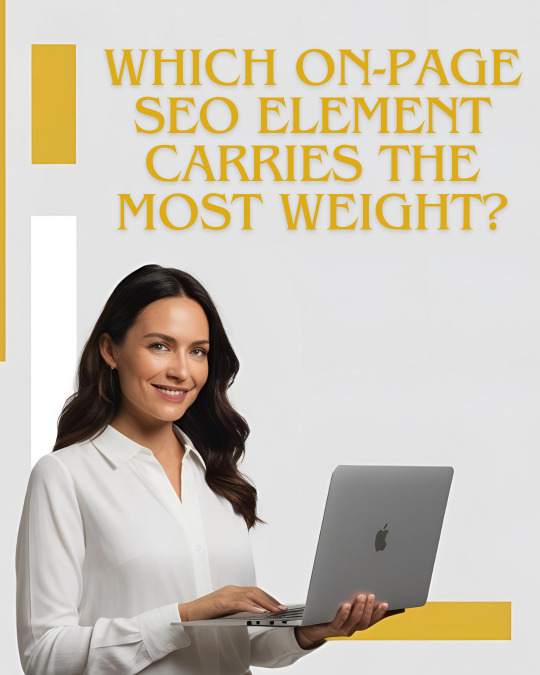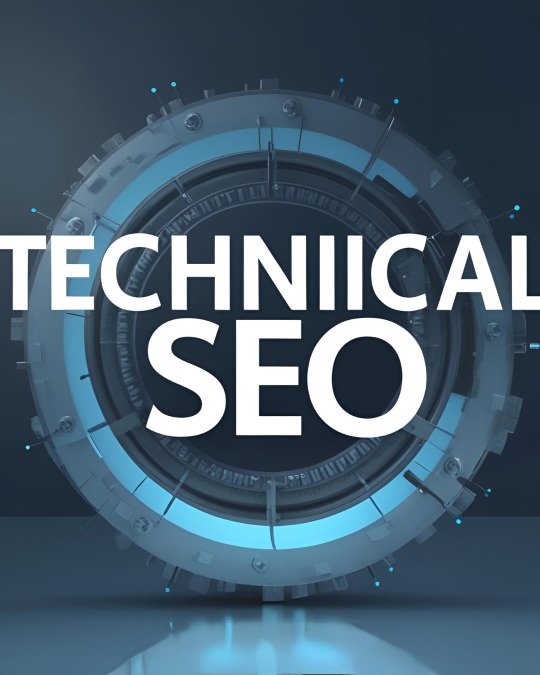Don't wanna be here? Send us removal request.
Text
Which On-Page SEO Element Carries the Most Weight?
Okay, so you want your website to show up on Google, right? I get it, and you want to know which on page SEO element carries the most weight so that you can focus on it the most.
I've been there too, scratching my head and wondering why my site wasn't showing up anywhere. Let me share what I've learned about on-page SEO and which bits actually matter the most.

What's This On-Page SEO Thing Anyway?
So on-page SEO is just fancy talk for all the stuff you can fix directly on your website to make search engines notice you. It's the opposite of off-page SEO, which is mostly about getting other websites to link to you (and that's a whole different headache!).
I remember when I first started learning about on-page SEO - it was super confusing! There are so many parts to it, and everyone online seems to have different opinions about what works.
After years of trial and error (and lots of coffee), I've figured out which elements actually carry the most weight for ranking.
Title Tags - The Big Boss of On-Page Elements
Listen, if you don't remember anything else from this chat, remember this: your title tag is THE on-page element carries the most weight. Full stop.
The title tag is that clickable blue headline you see in search results. Google absolutely loves title tags because they're like the name tag for your web page. They tell search engines exactly what your page is about.
I learned this the hard way when I had a website about cricket equipment that wasn't getting any traffic. The moment I changed my generic title tags to more specific ones like "Best Cricket Bats Under 2000 Rupees," my search engine ranking jumped like crazy!
Here's what works for title tags:
Keep 'em under 60 characters (or Google will chop them off)
Stick your main keyword near the beginning
Make them sound interesting enough that you'd click on them yourself
Meta Descriptions - The Silent Helper
Meta descriptions don't directly help your search engine result position, but they're still super important. Think of them as your tiny ad on the search results page.
My friend Rohit ignored meta descriptions completely on his website selling homemade pickles. His click rates were terrible until we rewrote them all to actually tell people why his pickles were special. His traffic doubled in a month!
A good meta description should make people curious enough to click. It's like when you're walking past a shop and the owner calls out to tell you about a special deal inside.
Headings - Breaking Up Your Content
Headings are those H1, H2, H3 things you see in your website editor. They're not just for making text bigger - they help search engines understand how your content is organized.
I used to just make text bold and bigger when I wanted a heading. Big mistake! Proper heading tags are important on-page elements that tell Google, "Hey, this is an important section about this specific topic!"
Your H1 tag is especially important and should have your main keyword in it. But don't go crazy - one H1 per page is enough.
The Actual Words on Your Page
Obviously, your page content matters a ton. But here's the thing - it's not about stuffing keywords anymore like it was in 2010. Search engines have gotten really smart at understanding what good content looks like.
I was chatting with a guy from Rank One Leads last week, they're one of the Best Digital Marketing Agency in Dehradun that works all over India and even do international projects, and he was saying how their content strategy focuses more on answering questions thoroughly than keyword density. That approach makes sense to me.
Write like you're explaining something to a friend, not like you're trying to impress a robot. Trust me, Google can tell the difference!
Internal Linking - The Underrated Champion
This is something so many website owners mess up! Internal linking (where you link to other pages on your own website) is a seriously powerful on-page element that many people ignore.
I've seen websites jump 20+ spots in search engine ranking just by adding smart internal links. It helps Google understand how your content fits together, and it spreads link juice around your site.
Don't just link randomly though. Link from one page to another when it actually makes sense and helps the reader learn more about a related topic.
Alt Text for Images - Don't Skip This!
Okay, confession time. I used to upload images without alt text because I was lazy. Then I realized search engines can't "see" images - they can only read the alt text to understand what the image shows.
Adding proper alt text to images can help your search engine ranking, especially for image searches. It's also just good for people who use screen readers, so it improves user experience too.
Technical SEO Stuff That Matters

Your page speed is super important these days. I had a client whose website took 15 seconds to load (yikes!), and no amount of perfect title tags could save them from ranking poorly.
Google doesn't want to send people to slow websites because it creates a bad user experience. Make sure your images are compressed, your hosting is decent, and you're not loading a bunch of unnecessary junk.
Different Elements for Different Situations
Here's something most SEO guides don't tell you - which on-page element carries the most weight can actually vary depending on your situation:
If Your Website is Brand New
For fresh websites, focus on:
Getting those title tags perfect from day one
Creating content that's way better than what's already ranking
Setting up a logical website structure
If Your Website is Already Established
For websites that have been around the block:
Go back and fix title tags on pages that aren't performing well
Add more internal links to spread authority around
Update old content to make it better and more current
What a Complete On-Page SEO Plan Looks Like
If you're serious about ranking, here's what you need to do:
Figure out what people are actually searching for (keyword research)
Create killer title tags that carry the most weight possible
Write meta descriptions that make people want to click
Break up your content with proper heading tags
Write stuff that's actually helpful and answers people's questions
Add alt text to all your images
Link between your pages in a way that makes sense
Make sure your website loads fast and works on mobile
It's not rocket science, but it does take time and attention to detail. If you're occupied with other work, companies like Rank One Leads handle this kind of thing day in and day out.
On Page SEO Mistakes I See All The Time
Let me save you some headaches by pointing out the common on-page SEO mistakes I've seen (and made myself):
Using the same boring title tag for multiple pages
Forgetting meta descriptions entirely
Not using heading tags (or using them incorrectly)
Writing thin content that doesn't really say anything useful
Ignoring how the page looks and feels to actual humans
Having a website that looks terrible on mobile phones
How Google Actually Judges Your Page?
The way search engines look at your on-page elements has changed a lot over the years. These days, they're looking at:
Whether your title tag actually matches what the searcher wants
If your content covers the topic thoroughly, not just superficially
Whether people who click on your result stick around or bounce back to search results
How well your page works technically (loading speed, mobile-friendliness, etc.)
How Do You Know If It's Working?
You need to keep an eye on a few things to know if your on-page elements are carrying their weight:
Are you ranking for the keywords you care about?
Is organic traffic increasing over time?
Are people sticking around on your page or leaving right away?
Are those visitors actually doing what you want them to do (buying, signing up, etc.)?
Google Search Console and Google Analytics are free and will tell you most of what you need to know.
What's Coming Next for On-Page SEO
From what I can see, on-page SEO is shifting more toward user experience signals. Those websites that are genuinely helpful and easy to use are getting more love from Google.
That said, the fundamentals like title tags, quality content, and proper HTML elements aren't going anywhere. They'll always be the foundation of good on-page SEO.
Wrapping Things Up
Look, at the end of the day, the title tag carries the most weight of all on-page elements, but you can't just focus on that and ignore everything else. On-page SEO works best when all the elements work together.
The thing about on page SEO is that it's never really "done." You need to keep checking and tweaking things as search engines evolve and your competitors up their game. If you want to learn more details and want to reach on the top on search engine result pages, those folks at Rank One Leads know their stuff.
1 note
·
View note